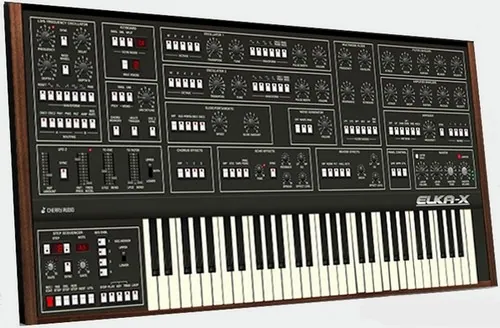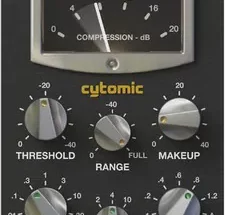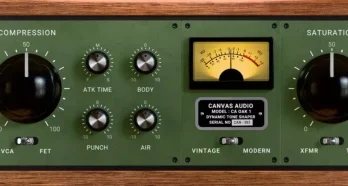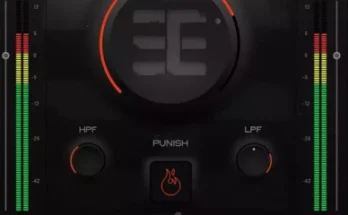Cherry Audio Elka-X synthesizer is based on the legendary Synthex , a rare Italian analog synthesizer designed by Mario Maggi and produced by ELKA in the early eighties. Elka-X replicates the original synth’s extraordinary character without sacrificing sound or functionality, thoughtfully expanding the feature set and delivering an authentic Synthex experience at a price that anyone can afford.
Description Continued
“Had it been built by a more prestigious manufacturer and released at a more reasonable price, ELKA Synthex could possibly have competed with the DX7 and prevent analog from being so overwhelmed by digital.” — Peter Forrest (1998), Analog Synthesizers A to Z Part One.
The Synthex included a combination of unusual and forward-thinking features that set it apart from other contemporary synthesizers, including highly stable digitally controlled analog oscillators and a flexible four-pole multi-mode filter. Unlike most other popular synthesizers that use CEM3320 filter chips in a low-pass-only configuration, the Synthex filter has a 24dB/octave low pass mode, 6 and 12dB/octave bandwidth modes, and a 12dB/octave high pass mode. Along with the powerful built-in analog chorus effect, this gave the Synthex a distinct and powerful tonality. It was multi-timbral, with the ability to play two separate patches at the same time in split or overdub mode. It even included an innovative four-track sequencer with real-time recording and transposition.
Because ELKA’s main market was home organs, they never really established themselves in the professional synthesizer market. Unfortunately, the whirlwind of excitement caused by the release of the Yamaha DX digital synthesizers in 1983 pushed this excellent instrument into the background, without achieving the deserved success.
By the mid-80s, ELKA made the last Synthex for Stevie Wonder, who used it for a distinctive bass tone on his single “Skeletons” from the 1987 album Characters. Other notable Synthex users included Geoff Downes of supergroup Asia, Keith Emerson, Nick Rhodes of Duran Duran, Peter Howell of the BBC Radiophonic Workshop, and Jean-Michel Jarre who used it extensively on Rendezvous and for his famous “laser harp”. ” sound.
The Synthex included a combination of unusual and forward-thinking features that set it apart from other contemporary synthesizers, including highly stable digitally controlled analog oscillators and a flexible four-pole multi-mode filter. Unlike most other popular synthesizers that use CEM3320 filter chips in a low-pass-only configuration, the Synthex filter has a 24dB/octave low pass mode, 6 and 12dB/octave bandwidth modes, and a 12dB/octave high pass mode. Along with the powerful built-in analog chorus effect, this gave the Synthex a distinct and powerful tonality. It was multi-timbral, with the ability to play two separate patches at the same time in split or overdub mode. It even included an innovative four-track sequencer with real-time recording and transposition.
Because ELKA’s main market was home organs, they never really established themselves in the professional synthesizer market. Unfortunately, the whirlwind of excitement caused by the release of the Yamaha DX digital synthesizers in 1983 pushed this excellent instrument into the background, without achieving the deserved success.
By the mid-80s, ELKA made the last Synthex for Stevie Wonder, who used it for a distinctive bass tone on his single “Skeletons” from the 1987 album Characters. Other notable Synthex users included Geoff Downes of supergroup Asia, Keith Emerson, Nick Rhodes of Duran Duran, Peter Howell of the BBC Radiophonic Workshop, and Jean-Michel Jarre who used it extensively on Rendezvous and for his famous “laser harp”. ” sound.
Features of Elka-X
Two-Part Multitimbral Operation: Plays two different patches simultaneously, either in split mode
or layered mode, with a user-defined split point and separate layer volume and pan controls.
16 polyphonic voices that can be layered or split across the entire keyboard.
Layer selection control panel with a utility function to exchange settings between lower and upper sound layers or even between presets.
Two DCOs with triangular, sawtooth, square and variable pulse waveforms and independent tuning.
Modes for polyphonic, single voice and monophonic unison with unison detuning.
PWM cross modulation and ring modulation for both oscillators.
White or pink noise generator.
CEM3320 style multi-mode filter with 12 or 24dB/oct, 6 or 12dB/oct, or 12dB/oct bandwidth
Two tempo-locked LFOs.
Two independent modulation sections: a fixed LFO 1 section and a performance-oriented LFO 2 section,
designed for use with the pitch and modulation controls.
LFO 1 has triangular, sawtooth, sawtooth, bipolar square, unipolar square, and random waveforms;
LFO triangle wave only 2
ADSR Filter and Amplifier envelope generators with Velocity control.
Multi Trigger for ADSR Filter Envelopes and Amp (in mono modes)
Chord Memory and Oscillator 2 sync.
Tempo Sync buttons for LFO 1 and 2, sequencer speed, arpeggio speed, and echo speed for easy synchronization with DAW project tempo.
A step sequencer consisting of four separate monophonic sequences,
each with a user-defined length of up to 128 steps, assignable to any layer and stored with presets.
Step Sequencer utility for copying, replacing and moving sequencer data between tracks or from one preset to another.
Glide (pitch envelope) and Portamento (standard glide) independently enabled for each oscillator.
Tempo-synced arpeggiator, independently assignable to both layers.
Studio-quality chorus, echo delay and reverb effects, including our famous Galaxy reverb algorithm.
Cherry Audio’s popular Zoom Zoom feature and standard drag and drop zoom and resize UI
Over 600 presets created by a talented and diverse group of sound design veterans.
Complete MIDI control and DAW automation for all controls with easy to use MIDI training.
Preset and global MIDI mapping.
Highly optimized encoding for optimal performance with ultra-low CPU usage.
User configurable resampling control.
or layered mode, with a user-defined split point and separate layer volume and pan controls.
16 polyphonic voices that can be layered or split across the entire keyboard.
Layer selection control panel with a utility function to exchange settings between lower and upper sound layers or even between presets.
Two DCOs with triangular, sawtooth, square and variable pulse waveforms and independent tuning.
Modes for polyphonic, single voice and monophonic unison with unison detuning.
PWM cross modulation and ring modulation for both oscillators.
White or pink noise generator.
CEM3320 style multi-mode filter with 12 or 24dB/oct, 6 or 12dB/oct, or 12dB/oct bandwidth
Two tempo-locked LFOs.
Two independent modulation sections: a fixed LFO 1 section and a performance-oriented LFO 2 section,
designed for use with the pitch and modulation controls.
LFO 1 has triangular, sawtooth, sawtooth, bipolar square, unipolar square, and random waveforms;
LFO triangle wave only 2
ADSR Filter and Amplifier envelope generators with Velocity control.
Multi Trigger for ADSR Filter Envelopes and Amp (in mono modes)
Chord Memory and Oscillator 2 sync.
Tempo Sync buttons for LFO 1 and 2, sequencer speed, arpeggio speed, and echo speed for easy synchronization with DAW project tempo.
A step sequencer consisting of four separate monophonic sequences,
each with a user-defined length of up to 128 steps, assignable to any layer and stored with presets.
Step Sequencer utility for copying, replacing and moving sequencer data between tracks or from one preset to another.
Glide (pitch envelope) and Portamento (standard glide) independently enabled for each oscillator.
Tempo-synced arpeggiator, independently assignable to both layers.
Studio-quality chorus, echo delay and reverb effects, including our famous Galaxy reverb algorithm.
Cherry Audio’s popular Zoom Zoom feature and standard drag and drop zoom and resize UI
Over 600 presets created by a talented and diverse group of sound design veterans.
Complete MIDI control and DAW automation for all controls with easy to use MIDI training.
Preset and global MIDI mapping.
Highly optimized encoding for optimal performance with ultra-low CPU usage.
User configurable resampling control.




